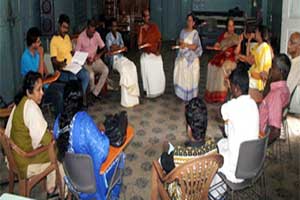Peer support changes lives

People who are aware that their lives have been shortened by life-limiting diagnoses face enormous alterations and challenges to many aspects of their lives. Professional and family and community-based support can make a difference to the quality of people's lives and an opportunity for people to remain in their homes and to minimize institutional admissions to hospitals, hospice or nursing homes. Peer support groups are effective at the increasing perception of social support for patients who feel unsupported. Peer support links people living with a chronic condition and they are able to share knowledge and experiences, including some that many health workers do not have. Social support results in psychological and physical health benefits for both the receiver and the provider.
Peer support relies on non-hierarchical, reciprocal relationships, which provide a flexible supplement to formal health system services for people with chronic diseases. Peer support occurs when people provide knowledge, experience, emotional, social or practical help to each other. It commonly refers to an initiative consisting of trained supporters and can take a number of forms such as peer mentoring, reflective listening, or counselling. Peer support has four core functions.
Assistance in daily management: Peer supporters use their own experiences with diet, physical activity and medication adherence in helping people figure out how to manage the chronic illness in their daily lives. They can also help in identifying key resources, such as where to buy healthy foods or pleasant and convenient locations for exercise.
Social and emotional support: Through empathetic listening and encouragement, peer supporters are an integral part of helping patients to cope with social or emotional barriers and to stay motivated to reach their goals.
Linkages to clinical care and community resources: Peer supporters can help bridge the gap between the patients and health professionals and encourage individuals to seek out clinical and community resources when it is appropriate.
Ongoing support, extended over time: Peer supporters successfully keep patients engaged by providing proactive, flexible, and continual long-term follow-up.
In order to have regular interaction with our patients, we have formed Peer Support Groups. Our experienced team of volunteers and doctors are conducting these groups. Monthly or bi-monthly meetings are conducted for patients where their problems are discussed and solutions found or suggested by doctors. There is also an interaction between patients on their own experiences with the disease and how they have surmounted the ordeal. There is also a playtime when patients can play chess, carrom, etc. We are getting a very encouraging response to these group activities. These groups also encourage member patients to learn a craft with which they can manage their living, like soap making, artificial flower making, carry home bag making, etc. PPCS also has an outlet for these products. This is part of the rehabilitation project of PPCS.
Currently we are guiding the following support groups
- Kidney Patients Group (Chetana)
It is very important for those serving in the field of palliative care to understand the mental, emotional and social problems faced by the patients, their family members, and other caregivers. The problems faced by kidney patients being unique to their health condition and also due to legal issues involved, it was decided that a support group be dedicated to the mitigation of problems faced by kidney patients and their family members under the auspices of Pain and Palliative Care Society. This support group, which started its service in a defined manner in November 2015, was named Chetna (meaning: Consciousness). Read more.. - Colorectal Cancer Support Group (CRCSG)
The objective of the Colorectal Cancer Support Group (CRCSG) is providing focused attention and better service to the group of persons affected by colorectal cancer (Colon & Rectum Cancer). This support group aims to rehabilitate newly-treated colorectal cancer patients to enable them to adjust to a new quality of life. These patients have similar issues to tackle during the treatment and management of their condition. Read more.. - Mental Health Group (MHAT)
MHAT is a registered charitable trust based at the Institue of Palliative Medicine in Kozhikode, Kerala. Aim of the trust is to provide free community based mental health care to economically backward people. MHAT aims to demonstrate that comprehensive psychosocial care can be provided in resource-scarce settings. Read more..